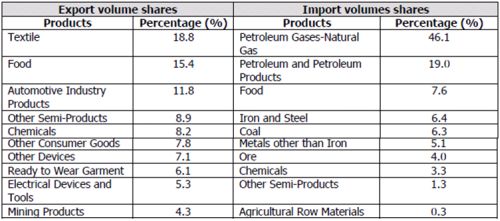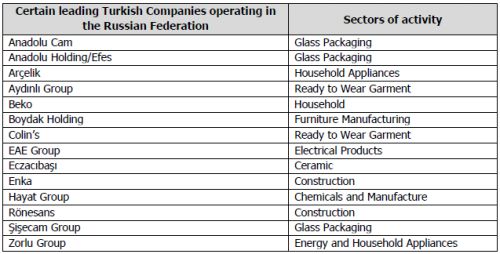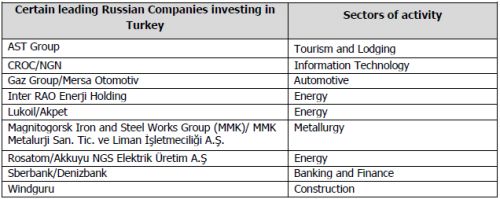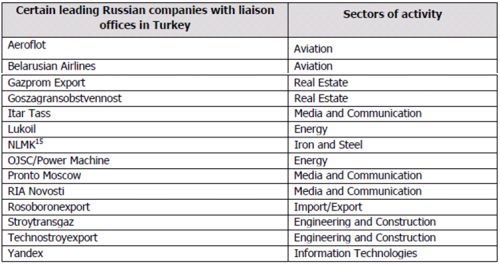Both Turkey and the Russian Federation play a significant role in the global economy and world trade, standing out as promising emerging markets and economic growth drivers along with Brazil, India and China. In recent years, the Russian Federation became Turkey's main competitor in terms of attractiveness for investments after China. On the other hand, the Russian Federation turned out to be Turkey's key trading partner. Trade volume between Turkey and the Russian Federation cumulated to approximately USD 33 billion1 to date. Commercial and economic ties are expected to grow since both countries set a bilateral trade volume target of USD 100 billion2 by the end of 2020.
The Russian Federation ranked sixth among Turkey's most preferred exports destination in 20123, and the ratio of Turkey's export to the Russian Federation was approximately 5%4 of its total export in that year. According to the data provided by TUSKON5, exports from Turkey reached USD 7.3 billion in 2013. The largest export categories are (i) textile, fabrics, manufactured goods, (ii) vegetables and fruits and (iii) vehicles.
The Russian Federation was also Turkey's number one importer in 2012 with the approximate amount of USD 26.6 billion. Imports from the Russian Federation increased by 11.2% compared to 2011 and by 600% compared to 20026. The largest import categories were (i) natural gas, (ii) crude oil and fuel products and (iii) iron and steel.
First 10 Products/Product Groups in Turkish - Russian Foreign Trade7

Turkey's direct investment in the Russian Federation reached USD nine billion by the end of 20128. Textile and ready to wear garments, food & beverages and construction are commonly preferred by Turkish companies as investment arenas. Companies such as Anadolu Group, Anadolu Cam, Arçelik, Beko and Eczacıbaşı actively operate in the Russian Federation. Şişecam Group's investments reached USD 750 million whereas Zorlu Enerji invested more than USD one billion for its power plant project in the Russian Federation. Boydak Holding acquired a factory in Vladimir and has been manufacturing furniture for Bellona brand.

Approximately, 300 Turkish construction companies currently operate in the Russian Federation. The Turkish construction companies have finalized the construction of over 1,300 projects with the approximate size of USD 40 billion within the last 20 years9. Many of the Turkish companies took significant roles in building sports and accommodation facilities for the 2014 Winter Olympics held in Sochi in February 2014. Nowadays, 2018 FIFA World Cup which will be held in the Russian Federation stands out as an attractive opportunity for the Turkish contractors.
Meanwhile, foreign direct investments of the Russian companies in Turkey tapped USD 2.7 billion by the end of 201210. Russian firms are mainly interested in telecommunications, energy and tourism sectors in Turkey. According to the data provided by the Russian Federation Chamber of Commerce and Industry and TUSKON, Russian firms have invested approximately USD 900 million last year and the total invested amount so far exceeds USD 6 billion.
Russian nuclear energy company Rosatom is expected to invest USD 20 billion for Turkey's first nuclear power plant project in Mersin Akkuyu. In 2013, the vice general manager of Rosatom, Kirill Komarov, announced that the company has already executed contracts with 15 local companies, total value of which is USD 110 million. The project provided more than USD 700 million capital inflow so far11. Russian pharmaceutical company R-Pharma, has announced its plan to invest EUR 100 million in the upcoming years12. CROC, a Russian technology company has acquired a majority stake in NGN, a Turkish information technology company. In September 2012, Russia-based Sberbank acquired 99.85% of Denizbank for USD 3.5 billion13. Furthermore, Russian search engine Yandex recently started to provide services in Turkey. Power Machine OJSC and ERG İnşaat signed a bilateral memorandum of strategic partnership for the production of turbine plant equipment for the Akkuyu NPP Project.
Turkey also attracts Russian businessmen individually. Mikhail Prokhorov established a joint stock company, Windguru İnşaat for his major hotel project in Çeşme while Russian businessman Abramoviç visited Turkey for a potential golf course project.

According to the list provided by the Ministry of Economy, approximately 1,628 companies with Russian capital currently operate in Turkey and companies such as Belavia Belarusian Airlines, Gazprom Export Ltd., Pronto Moscow, Power Machine OJSC, RIA Novosti and Vils Ltd. have liaison offices in various cities14. The Turkish government plan to increase the collaboration between both countries and encourage major Russian companies to further invest in Turkey.

Prominent projects such as Samsun-Ceyhan pipeline, Güney Akım, Mavi Akım, MMK Atakaş's investment of USD two billion, the acquisition of Akpet by Lukoil for USD 500 million, other real estate purchases, tourism opportunities and Turkey's commercial and economic interests in the Russian Federation indicate that the relations between both countries will continue to excel.
Footnotes
1 Turkish Statistical Institute, (TSI).
2 The Republic of Turkey Prime Ministry Investment Support and Promotion Agency, Invest in Turkey, News, 26 November 2013.
3 Republic of Turkey Ministry of Economy, Countries & Regions-Commonwealth of Independent States, Russian Federation, July 2013.
4 DEİK, Foreign Economic Relations Board/ Turkish Russian Business Council Report, April 2013.
5 Turkish Confederation of Businessmen and Industrialists.
6 Republic of Turkey Ministry of Economy, Countries & Regions-Commonwealth of Independent States, Russian Federation, July 2013.
7 DEİK/ Turkish Russian Business Council Report, April 2013.
8 Republic of Turkey Ministry of Economy, Countries & Regions-Commonwealth of Independent States, Russian Federation, July 2013.
9 Turkish and Russian Federation Commerce and Investments Panel, Istanbul, 13 March 2014.
10 Republic of Turkey Ministry of Economy, Countries & Regions-Commonwealth of Independent States, Russian Federation, July 2013.
11 Republic of Turkey Ministry of Economy, Foreign Direct Investment Report, 2011
12 The Republic of Turkey Prime Ministry Investment Support and Promotion Agency, Invest in Turkey, News, 28 May 2013
13 Ernst&Young's Attractiveness Survey, Turkey 2013
14 Republic of Turkey Ministry of Economy, Foreign Direct Investments, List of Liaison Offices and Foreign Companies in Turkey as of the end of December 2013
15 NLMK operates through its commercial agent and representative, Arimpex Dış Ticaret ve Mümessillik Ltd. Şti. in Turkey.
© Kolcuoğlu Demirkan Attorneys at Law, 2014
The content of this article is intended to provide a general guide to the subject matter. Specialist advice should be sought about your specific circumstances.

